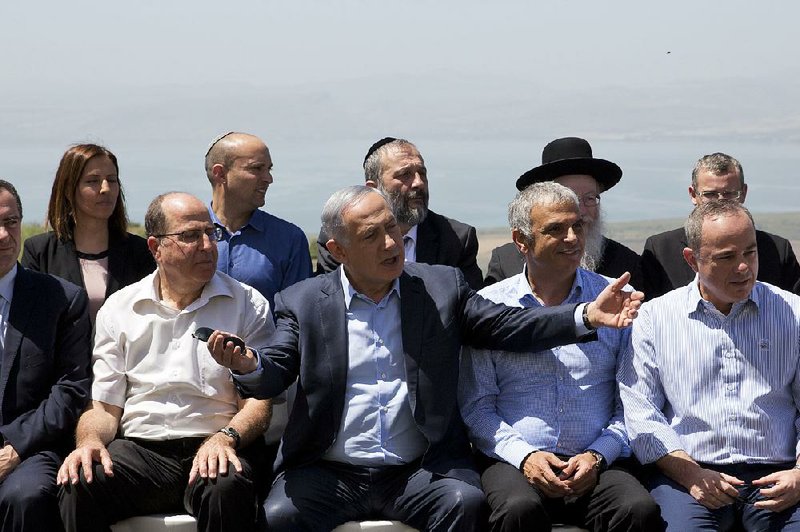JERUSALEM -- Israeli Prime Minister Benjamin Netanyahu has sparked a new diplomatic brush fire by declaring that the Golan Heights, seized from Syria in the 1967 Mideast war, is and should remain sovereign Israeli territory.
But after tough international criticism, Israeli officials have begun to backtrack, saying that a 1981 decision to apply Israeli law to the strategic plateau fell short of annexation and implying that Netanyahu misspoke.
The debate offers a window into a more nuanced Israeli perspective that, despite statements from the country's hard-line political leadership, continues to leave the door open, just barely, to a peace deal when Syria's civil war finally winds down.
For now, the debate is mostly academic. Syria has been engulfed in civil war for more than five years, and there is no end in sight. With Syria, and the Syrian side of the Golan, divided between Syrian troops and various rebel forces, there is nobody to talk to, even if Israel decided to open negotiations.
But the Golan remains central to any future peace deal with Syria, and its fate is a key part of a 2002 Saudi initiative that offered Israel peace with the Arab world in exchange for a full withdrawal from all territories captured in the 1967 Mideast war.
While that offer is usually connected to areas sought by the Palestinians, the Golan also is considered occupied land by the international community. Past Israeli leaders, including Netanyahu, have held talks with Syria about control of the Golan.
So when Netanyahu convened his Cabinet for a first-ever meeting in the Golan on April 17, he triggered an international uproar by calling it "sovereign" Israeli territory.
"The Golan Heights will forever remain in Israel's hands," he declared. "After 50 years, the time has come for the international community to finally recognize that the Golan Heights will remain under Israel's sovereignty permanently."
The U.S., Israel's closest ally, quickly criticized Netanyahu, saying the Golan is "not part of Israel." Germany and the European Union also rejected his statement, as did the Arab League, the 57-member Organization of Islamic Cooperation and the Syrian government. And early this week, the United Nations Security Council took issue with him.
"Council members expressed their deep concern over recent Israeli statements about the Golan and stressed that the status of the Golan remains unchanged," said Council President Liu Jieyi, China's ambassador to the U.N. He noted a previous 1981 resolution that said Israel's decision to impose Israeli law on the Golan is "null and void."
Alan Baker, a former legal adviser to Israel's Foreign Ministry, said the parliamentary decision to impose Israeli law back in 1981 was "merely a means of governing" the territory. He said that previously, Syria had deferred to the local Druze population, whose secretive religion and customs were difficult to apply after Israel took over.
He said Israel was careful not to annex the territory -- a decision that would require additional parliamentary action -- in order not to "prejudice" future border negotiations with Syria.
"Israel has never claimed the Golan to be part of its sovereign jurisdiction," Baker said. "That's why in my opinion, the statement that was made was somewhat ill-advised."
In reality, Israel has in effect already annexed the territory, and any thought of returning it to Syria is deeply unpopular with Israelis. More than 20,000 Israeli settlers now live in settlements on the Golan, according to Israeli statistics.
The territory, with its rugged terrain, open spaces and sweeping views of Syria and northern Israel, is a popular tourism spot that is home to high-end wineries, rustic restaurants and cattle farms. The native Druze population, who number about 20,000 people, mingle freely with Israeli Jews and are eligible for Israeli citizenship.
The system in the Golan is part of a legal kaleidoscope that Israel has created since the 1967 war. Shortly after the war, it annexed east Jerusalem, home to the city's most important holy sites, in a move that also has not been internationally recognized. Under interim peace accords, military rulings and special stipulations, West Bank settlements are subject to Israeli jurisdiction, while Palestinians are subject to a combination of their own municipal and family laws, as well as Israeli military law for security offenses.
In a statement this week, Israeli Foreign Ministry spokesman Emmanuel Nahshon accused the Security Council of "ignoring reality" with its criticism.
"With whom is Israel supposed to negotiate the future of the Golan -- Islamic State? Al-Qaida? Hezbollah? The Iranian and Syrian forces that slaughtered hundreds of thousands of people?" he said. "The suggestion that Israel will withdraw from the Golan is not reasonable."
Still, he acknowledged that the Golan Heights are not part of "Israel proper," even if Israeli law is enforced there.
Netanyahu's spokesman, David Keyes, also described the prime minister's comments this month as political, and said the Golan's legal status has not changed.
"The territory must remain under Israeli control for a simple reason. When Syria ruled the Golan, it was used as a staging ground for attacking Israeli civilians. It was mined and crisscrossed with barbed wire. It was a place of war. In the nearly five decades since Israel liberated the Golan, it has been used for agriculture, tourism and great wine. It is now a place of peace," Keyes said.
A Section on 04/29/2016
